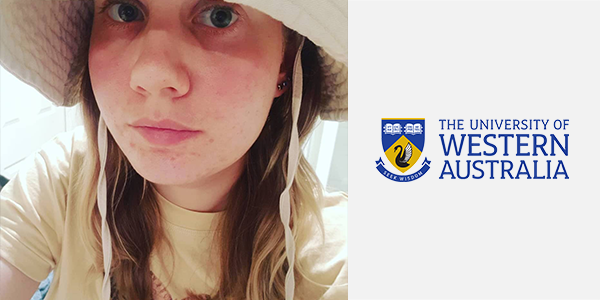Jaide Morgan was a participant in the 2022 Sustainable Tourism Professional Practicum from The University of Western Australia. Jaide is studying a Bachelor of Arts, majoring in Psychology and Japanese. Jaide received a $3,000 New Colombo Plan Mobility Grant to support her participation in this program.
Q: Why did you decide to undertake the ACICIS virtual internship program?
As a language student who first became obsessed with languages and foreign cultures at the tender age of nine, I took a step back and thought about the doors learning Japanese opened for me and what it meant to discover a totally new country. As an aspiring psychologist, I want to love on and get to know people from all walks of life and knowing how friendly and warm-hearted Indonesian people are from my sneaky trips to Bali, I was all too keen to take this amazing opportunity.
Q: Did you receive a New Colombo Plan Mobility Grant? Do you think the NCP is an important initiative?
I absolutely did and even working as much as I did, I couldn’t have enjoyed this awesome program without the grant. Is the NCP important? Is the grass green? It’s thanks to the NCP funding my practicum that I learnt how important the NCP grant is. Bright, young minds from all over Australia are being exposed to the gado-gado melting pot that is Indonesia, walking away with a wealth of knowledge in Indonesia’s social, political, religious, historical, and cultural issues. I couldn’t think of anything more important as our relationship with Indonesia grows every day.
Q: How have you found the academic components of this virtual program – i.e. the language classes/seminars?
I was worried it was going to be too much and while it was full on, I had the time of my life. Seminars about environmental preservation, natural disasters, Australian-Indo ties and the aftermath of COVID were just a few of my favourites, and the tutorials where we discussed what we’d learnt led me to two great friends! Of course, as a language nerd the classes were pretty up there for me. Indonesian is completely different from Japanese, and I realized it’s this super cool skill just waiting for me to give it my best go.
Q: Which organisation are you interning with? (Explain your role and responsibilities)
I was with a sustainable village in Bali called Sun Sang Eco Village. My mentor was great and it was a lot less stress than I thought it’d be. I worked alongside this great girl and my duties were proof reading, correcting English mistakes, making social media posts, and designing a new brochure.
Q: How have you found the work culture of your host organisation? How is it different to work experience in Australia?
So much more relaxed. It was normal for meetings to get cancelled last minute and when we did have them, they were super casual. I felt like I had more freedom to take my time with my work than I would in Australia.
Q: What are the main skills you have learnt during your virtual internship?
How to say wholesome sentences to my friends in Bahasa Indonesia, learning how to critically think, brainstorm with others and time management skills.
Q: What did you find to be the most rewarding part of this virtual experience?
Aside from discovering an interest in Bahasa Indonesia, everyone I worked with was so kind, driven, and smart beyond anything I could imagine. I think the single most rewarding thing for me was actually my sudden discovery a week into the practicum that I knew nothing about Indonesia at all! You think you know it all because you’ve been to Bali a few times, but there’s a whole world out there and it’s awe inspiring.
Q: Were you able to learn about the Indonesian culture from this virtual program? If yes, how was this achieved?
Yes. The language classes taught us a little about the cultural context behind certain words and phrases, but the seminars, tutorials and field trips were the bulk of our cultural education.
Q: How will the virtual internship benefit or influence your future career?
One of my plans for the future is working with languages either as a translator or in foreign affairs at institutes like DFAT. Knowing Japanese is already attractive to potential employers, but I feel like Indonesian would benefit me drastically. Also using the knowledge about Indonesia’s social, political, environmental, and historical contexts would be beneficial to just about any job in Australia.
Q: Would you recommend this virtual program to your friends??
Yes! It’s a lot of work but despite the long hours and pouring over assignments it never felt like “work”. Even if you’ve never been interested in Indonesia before or know nothing about it, all the better!
Q: Favourite Indonesian word/phrase:
It’s gotta be a tie between hati-hati and bertemu dengan, they just sound cool!
Q: Describe your experience of the virtual internship program in three words:
- Amazing
- Inspiring
- A-life-changing-experience (does that count as one word?)


